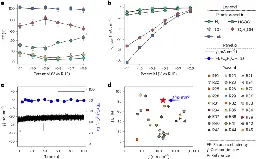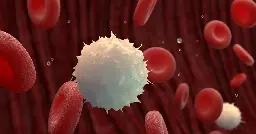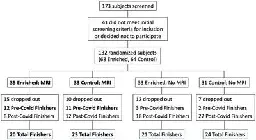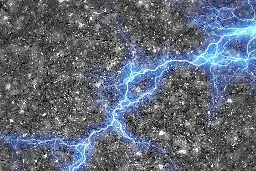It would not exclude clear differentiation, however. :)
Just like a chatbot posting on social media can add a message footer "this content was posted by a robot" to a fluent and human-like message, a humanoid robot, while having human form, can clearly identify itself as a robot.
Personally, I think such a design requirement is higly reasonable on social media (as a barrier or action threshold against automated mass manipulation) but probably also in real life, if a day comes when human-like robots are abundant.
Why the water isn’t killing the fire?
Could be anything from sodium to calcium carbide to fluorine. :) Sodium makes hydrogen with water, carbide makes acetylene with water, and flouride just oxidizes water by grabbing hydrogen away from oxygen.
If the character's plan is to try fascism next, I think they're into fairly agressive substances. :P
Back to farming kale, then. :)
So it's mainly asthma that people develop due to exposure to nitrogen oxide - and treating all the patients puts a considerable burden on society.
Unrelatedly, as a side note, I got curious about Portuguese cooking - for some reason the graphs show that cooking food in Portugal requires a three times higher percentage (30% as opposed to 10%) of overall energy consumption, implying either lower energy use for everything else, or higher energy use for cooking.
I wonder if there's some secret sauce that is only made in Portugal and which is extremely energy-intensive? Or just a case of broken statistics...
I mean sure, if you’re at such extreme latitudes that you have months of total darkness, then solar will have a problem there. Maybe small modular reactors make sense for those niche applications.
Currently, solar still makes economic sense, but from April to October. Lots of it was built rather fast, now the adoption is slowing since the grid can't accept it everywhere.
Consequently, summer is when oil shale miners rest and prepare for the next season.
Since the goal is to get rid of mining oil shale, big plans exist to install a lot of wind power. Sadly, this has gone embarrassingly slow, and it cannot cover winter consumption, and there is not enough storage.
As a result, some companies and building out storage, but only enough to last a few hours.
...and in the next country southwards, there is a huge gas reservoir that could accept methane, enough to last the whole winter, but nobody has a good enough handle on methanation to renewably produce a considerable quantity and store it there. :o
With regard to reactors, it seems likely that getting one would take 10 years and the local country here doesn't even have legislation built out for nuclear power. They're drafting it. Starting from zero is quite slow.
That's a pretty big gap to cover with spamming more panels. I would venture to guess: this approach would work up to latitude 45 or so.
https://www.engineeringtoolbox.com/surface-solar-radiation-d_1213.html
Where I live, in midwinter, the day is 6 hours long. Over here, wind turns more heads than solar. But yes, solar is riduculously quick to install.
Machinery comes is varying width. I would guess a farmer needs to decide at some point - is the priority using a 10-meter wide tool, or is it OK to settle with a 6-meter tool, or even a smaller one.
Basing on that, they'll decide what the clearance between rows of panels should be. From an energy installation viewpoint, the shadow of one row should not cover another row during normal operating conditions. Assuming sun at 30 degrees elevation ("September on latitude 60"), the shadow of a fence that's 1.2 meters tall will be about 1.75 * 1.2 = 2.1 m long. So from an energy generation viewpoint, one can pack things more densely than makes sense for farming.
Since 2021, nearly 4 full years, the world has closed less than 1% of active coal power plants.
Closing will come later, when alternatives are widely available. What renewable energy does currently - at least here - is forcing those plants temporarily out of the market, especially during summer months and windy weather. The plants will exist and stay ready in case of need for well over a decade, maybe even two - but they will start up ever more rarely.
Technically, the deal is: we don't have seasonal energy storage. Short term storage is being built - enough to stabilize the grid for a cold windless hour, then a day, then a week... that's about as far as one can go with batteries and pumped hydro.
To really get the goods one has to add seasonal storage or on-demand nuclear generation. The bad news is that technologies for seasonal storage aren't fully mature yet, while nuclear is expensive and slow to build. There's electrolysis and methanation, there's iron reduction, there are flow batteries of various sorts, there's seasonal thermal storage already (a quarter step in the right direction)...
...but getting the mixture right takes time. Instead of looking at the number of closed plants, one should look at the sum of emissions. To remain hopeful, the sum should stop growing very soon.
Also, costing €623,000 over three years sounds rather expensive for just 100m
It's hugely expensive, but I expect most of the cost to be in the wagon that lays panels down and picks them up - and could hopefully service a big stretch of railway (if it works). That kind of systems will cost a pretty big penny.
I doubt if this project will "fly", however. A totally horizontal solar panel at ground level is a far cry from producing energy efficiently.
Also relevant: "Always shoot the messenger first." :)
If news unsettles a person, and there's a cognitive dissonance upon processing their world model ("everything OK with climate") and sensory input ("another big freaking hurricane") then if the person isn't a model of rational thought and already has a fad for conspiracies...
...one might find it easier to add another conspiracy theory to one's collection, as opposed to harder steps like refreshing one's model of how the world functions. :o
Seems like a useful monitoring and accountability tool. :) Especially if its quantity estimates can be made accurate.
I think the study analyzed the footprint of the person, not the vehicle:
In this new study, the research team investigated whether consumers who purchase and drive such vehicles have a smaller carbon footprint than other consumers
The merits of electric vehicles are irrelevant to their study - and their study is irrelevant to the merits of electric vehicles.
So maybe they're not lying (or maybe they are, if they made a direct claim about the power mix of the Finnish grid), but they're definitely far from barking under the correct tree. They're barking in a different forest, not of transport economy, but of wealth and consumption. :)
The proliferation of a new technology typically doesn't start from poor people.
It starts from fanatics first. I built my first EV. It was crap, I cut it apart and sold the metal (environmental footprint: awful). Then I built my second EV. It drove around 10 000 km, but had to be retired due to metal fatigue (enviromental footprint: neutral at best, lesson learned: big).
I bought my third EV on a crashed vehicle auction. New front axle, stretching the frame back to correct dimensions... I drive it every day, but it's a crap car that I'd not recommend to my worst enemy. :) Environmental footprint: positive, I can produce fuel for myself from April to October. But if the same vehicle would be used by someone who doesn't produce (or buy) renewable power, the footprint would be less positive.
Anticipating the demise of my factory-made electric microcar, I am however building another EV. Again the footprint is negative, but I need information about how to easily manufacture one, and obtaining information has a cost in resources. :(
Meanwhile, of course, truly rich folks buy fancy and electronics-laden self-driving EVs which some then proceed to crash or mishandle due to lack of clue. People are like that and it will stick out in statistics.
IMHO: if they hadn't bought an EV, they'd have bought another kind of status symbol and would have used it even more wastefully. What matters more is what the average person can and will do. And how do we influence the auto makers to produce less resource-intensive vehicles?
I have a solar panel that died. A piece or plywood flung by a storm went right through it, leaving a 30 cm "wound".
Well, to be honest, it's alive, just weaker - the panel remains suitable for pumping water on the field during muddy season. I wouldn't take a good panel to such a bad place, but this panel, I have no worries about.
As for what happens when they really, really die - they get disassembled. The aluminum frame gets taken off and goes into metal recycling. Junction boxes go to where plastic goes - not a nice place. The glass and doped silicon go into a crushing mill, after which they get separated. The glass is easy to recycle, but the doped silicon is difficult to refine again to such a purity, so it likely won't become a solar panel. But it's a very small fraction of the panel's mass.
Unfortunately I don't know.
To correlate the effect with social processes, one would have to plot the same graph for multiple countries and see what processes occur in each history at the time of the lines forking apart (assuming they do so).
Some guesses: automation, perhaps globalization of supply chains, something related to the effectiveness of employees at bargaining with employers?
Looking at the beatiful show, I cannot avoid thinking: "each of them a potential weapon".
So in fair weather, when communication is smooth and all navigation systems are working, it's entirely feasible to coordinate a swarm of 10 000. Wow. :)
Soon enough, they will be coordinating each other in the presence of electronic warfare, and swarms of 100+ fly already, so 1000 is the next step. Anyone doing air defense is probably designing energy weapons (lasers, masers, etc) at a pace approaching madness, besides making ever-cheaper drones.
As for the environmental footprint - if each drone withstands 10 performances, they will probably save resources. :)
On individual scale, precisely that - a split type AC with one half indoors (or in a water tank) and the other half in an outdoor environement (air, water or ground).
If you're extracting heat from the environment, the machine lets the working fluid evaporate into the outdoor heat exchanger and compresses it back into the indoor heat exchanger. If you're cooling your premises - reverse that.
However, on a city scale, it's like "you've got a lot of sewage at 30 C" -> "your heat pump is a large building" -> "your sewage outflow is now at 10 C, but your underground heat reservoir gets charged to 140 C (stays liquid because of water column pressure), and you spend much less energy pumping the heat than you would spend heating the water directly".
I have had many encounters with cops, and I decide about the extent of cooperating with them on a case-by-case basis.
- landlord is illegally evicting my mother's neighbour --> I call cops and they prove how useless they are at prevention, but the matter goes to court and the landlord gets convicted later, and it was my only time to testify in court
- cops accuse me of ignoring their lawful order --> sorry, I was listening to music, didn't hear nothing, no comment, no comment, I admit nothing (nothing came of it)
- cops intrude into the squat yard without knowing it's a squat --> "the
droidsdrunken people you look for are elsewhere" --> the cops go elsewhere - cops raid the squat --> refuse to provide documents until threatened, require cops to provide their own ID, contest every statement and discuss the matter publicly in media
- cops try to steal equipment during a demonstration --> pull the equipment back and yell to them a description of what it is (I assume they thought I was planting a bomb instead of packing up)
- cops want to interview me about illegal demonstrations --> I politely tell them to fuck off, then call back and volunteer for the interview to convey the opinion of other anarchists :D
- a new squat is being established --> establish a security perimeter that is watched with attention and never let cops close
- an attempted squat gets burglarized and set on fire -> inform the fire brigade that a bottle of propane could be present (fortunately it was stolen), the fire brigade had better things to do than involve cops
- a new squat gets burglarized --> pepper spray the burglar and take their tools, without involving cops
- a new squat gets burglarized, episode N --> threaten the burglars and take their tools, without involving cops
- cops try to fall into a hole in ground during a stupid training excercise --> tell the cops not to go there, as they might fall in (leave untold: it would be a major embarrasment for squatters to rescue them)
- the squat is suddenly in the security perimeter of a NATO summit --> find some military lurking in the yard and invite them into the squat so they could be reasonably certain we don't have anything that shoots down planes :P (runway was about 250 m away)
- a drunken person tries to SWAT me at a street party --> fully explain the situation to the SWAT team and later participate in amateur theatre with cops to get the drunken person safely removed from the police station :o
- one drunken neighbour hits their spouse and when I forbid, hits me --> seeing that the neigbour has already paid for his deed since pepper was 100% effective and he'll feel extremely bad for many hours, I did not file a complaint to cops, although they were called and showed up
- after two geniuses tried to steal my car, but fled after a warning shot --> I did not involve cops
- after some person attacked his partner and hit her on street --> I pepper sprayed him, and since he took out a knife and attempted to come at me (I evaded, no harm occurred to me), I did call cops and make a complaint, as did the woman he had hit
- cops call me about one neigbour's car --> I don't remember anything (I did actually remember, but wasn't in a mood for helping them repress a neighbour)
- my car gets burglarized --> I ask the cops for info, they have none, I don't involve them beyond that
...etc.
P.S. I have once used DC to power a pump "directly". I use quotation marks because the pump (a water pump) was a brushless DC motor with an integrated controller. I used it on a field for removing water after a spring flood. Its controller accepted 24..48 V input, and it was powered from a 40 V solar panel brought on a wheelbarrow. :)
instead of powering the heat pump from the wall, the heat pump can be connected directly to a PV
I have no experience with this exact combination. I know that "batteryless" inverters exist, but most of them are on-grid inverters. In that scenario, all that matters is monitoring your production: if you don't want grid energy, you only run your system when your PV produces enough.
Another type of batteryless inverters are "pump inverters". Farmers seem to like them for pumping water from wells into water towers. A pump inverter can be configured to run at 50 Hz (or 60 Hz for North Americans) and 230..240 V (or 110 V for North Americans) alright, but it is not designed to power electronic devices, but dumb agricultural motors. There is considerable risk involved with powering a heat pump from a pump inverter, unless you find an exceptionally simple and dumb heat pump with very limited or resilient steering electronics.
Efficiency losses are small anyway, but mostly happen during battery storage or when voltage needs to rise or drop considerably (e.g. a transition of 700 -> 24 V or 24 -> 240 V would cause a small efficiency loss).
I’ve heard that a PV can directly power a compressor
This seems unlikely as the compressor would have to be a brushed DC motor. That kind of motors don't last long, they wear out their brushes. Long-lasting motors are brushless, and those generally cannot be run on DC power. For example, a "brushless DC" motor is essentially a three-phased AC motor, just its controller (full of smartness and MOSFET transistors) accepts DC input.
If you have a good technical overview of your heat pump system, maybe you can locate a point where regulated DC can be fed into the system, but that would be hacking. Alternatively, maybe a niche market already exists for DC-powered heat pumps, e.g. for caravans, trucks or ships? But on niche markets, prices typically aren't good for you. :(
This is not just a "happy birthday" post for Linux, but also a reminder that despite it becoming big and professional, the freedom to tinker with Linux remains accessible.
I had to use this freedom recently when I discovered that V4L video pipelines could buffer up to 32 frames both on the encoder and decoder (unacceptable, we demand minimum latency!) so it was again time to recompile the kernel. :)
My previous time to recompile parts of Linux had been a week ago. Some hacker had discovered a way of tricking their WiFi card beyond the legally permitted power - with what I understand as thermal compensation settings. Wanting to taste the sweet extra milliwatts, I noticed that nobody was packaging that driver as a binary, so the only way to get it was to patch and recompile its kernel module.
Finally of course, thanks to Linux we have countless open-source drivers and if you want to venture onto the path that Linus Torvalds took - of building an operating system - congratulations, you have less obstacles in your way. :) Some people have taken this path with the Circle project and you can compile your homebrew and bare-metal kernel for a Raspberry Pi with reasonable effort, and it can even draw on the screen, write to serial ports and flip GPIO lines without reverse-engineering anyone's trade secrets. :)
[this is an English translation of the original article in Polish, we occasionally publish the best cyber stories from Poland in English] A train manufactured by a Polish company suddenly broke down during maintenance. The experts

This article is about fixing, but with a twist - it's about fixing trains that their manufacturer sabotaged. :D
In Poland, it took the hacker crew "Dragon Sector" months of work to find a software "time bomb" that was sabotaging "Impuls" trains manufactured by Newag, once their maintenance was handed over to another company.
Let this be a reminder to everyone about closed source technology and critical infrastructure.
The majority of electrocatalysts selective for CO2 reduction to ethanol are based on Cu. Here the authors report a highly ethanol-selective Sn-based electrocatalyst, which is proposed to operate via a tandem mechanism.

Some Chinese researchers have found a new catalyst for electrochemically reducing CO2. Multiple such catalysts are known, but so far, only copper favours reaction products with a carbon chain of at least 2 carbons (e.g. ethanol).
The new catalyst requires a specific arrangement of tin atoms on tin disulphate substrate, seems to work in a solution of potassium hydrogen carbonate (read: low temperature) and is 80% specific to producing ethanol - a very practical chemical feedstock and fuel.
The new catalyst seems stable enough (97% activity after 100 hours). Reaction rates that I can interpret into "good" or "bad" aren't found - it could be slow to work. The original is paywalled, a more detailed article can be found at:
Carbon-Carbon Coupling on a Metal Non-metal Catalytic Pair
Overall, it's nice to see some research into breaking down CO2 for energy storage, but there is nothing practical (industrial) on that front yet, only lab work.
At least five people who spoke out against the war have been arrested so far.

The short war which Azerbaijan waged against Armenian-populated Karabakh after a months-long blocade is over (Armenian separatists lost, and will likely get ethnically cleansed out of the region)...
...but in the aftermath, it's worth pointing out that several high-profile Azeris did speak against their government starting a war - and were repressed.
The most worrisome case is the chairman of the confederation of trade unions, Afiaddin Mammadov. A provocateur who had previously injured himself threw a knife at him, and cops arrested him immediately after that, claiming he had injured the provocateur.
After years of anticipation and hard work by NASA’s OSIRIS-REx (Origins, Spectral Interpretation, Resource Identification and Security – Regolith Explorer) team, a capsule of rocks and dust collected from asteroid Bennu finally is on Earth. It landed at 8:52 a.m. MDT (10:52 a.m. EDT) on Sunday, in a...

To my knowledge, this is the second time a sample is returned from an asteroid to Earth - only preceded by Hayabusa-2 fetching a sample from asteroid Ryugu. The capsule has been found and the sample stabilized with nitrogen. Fetching the sample required 7 years, studying it will require a bit of time too.
It is too early to speculate whether interesting discoveries will follow, but Bennu is considered to be an interesting asteroid - likely not a break-up product, but something that represents the original composition of the solar system.
Bennu is also considered a hazardous space object, ranked high on the Palermo scale of impact risk and kinetic yield, so knowing what it's made of can be practically worthwhile.
More information here:
https://en.wikipedia.org/wiki/OSIRIS-REx
Pritzker Molecular Engineering researchers led by Prof. Jeffrey Hubbell showed that their compound can eliminate the autoimmune reaction associated with multiple sclerosis in a laboratory setting.

> The inverse vaccine, described in Nature Biomedical Engineering, takes advantage of how the liver naturally marks molecules from broken-down cells with “do not attack” flags to prevent autoimmune reactions to cells that die by natural processes.
> PME researchers coupled an antigen — a molecule being attacked by the immune system— with a molecule resembling a fragment of an aged cell that the liver would recognize as friend, rather than foe. The team showed how the vaccine could successfully stop the autoimmune reaction associated with a multiple-sclerosis-like disease.
ObjectiveCognitive loss in older adults is a growing issue in our society, and there is a need to develop inexpensive, simple, effective in-home treatments. This study was conducted to explore the use of olfactory enrichment at night to improve cognitive ability in healthy older adults.MethodsMale a...

Most people would typically think than smelling a scent (unless it's a powerful poison or medicament) won't change much in a person's health... but apparently, a variation in the scent environment has effect on the human brain, especially if the person is already old and their senses are degrading. It has also been observed that viral infections damaging a person's olfactory nerves result in changes to the brain - with less input, the neural networks involved with scent tend to atrophy. Coinidentally, some neural networks involved with scent recognition are also involved with memory.
Prios studies already support the idea that training one's sense of smell helps older people avoid cognitive deterioration. This study brings highly significant statistical results and adds one bit - wakefulness is not required to benefit. Apparently, the stimulation a person receives from feeling different scents bypasses sleep (or maybe, even improves the quality of sleep).
Marina Silva welcomes progress but says climate crisis means upcoming regional summit needs to produce real action

Long story made short: apparently, the previous administration didn't really try (since it was Bolsonaro's, I am not surprised). EU import controls and financial interventions have also helped:
> He believes the slowdown is due to a combination of factors: the resumption of embargoes and other protection activities by the government, improved technical analysis that reveal where problems are occurring more quickly and in more detail, greater involvement by banks to deny credit to landowners involved in clearing trees, and also wariness among farmers generated by the European Union’s new laws on deforestation-free trade. It may be no coincidence that deforestation has not fallen as impressively in the cerrado savanna, which is not yet covered by the EU’s controls.
Superconductivity is a condition of matter where resistance to electrical current disappears.
The first superconductors needed cooling to near the absolute zero. The next generation worked at temperatures of liquid nitrogen. A room-temperature atmospheric-pressure superconductor is a highly sought after material (e.g. it would expand possibilities to hande plasma for fusion research and make MRI machines easier to build).
A substance named LK-99 has recently caused interest in the research community. Its a copper-enriched lead apatite, typically made by reacting lead sulphate with copper phosphide. It is speculated to be superconductive at room temperature.
It is also thought that interesting properties are not inherent to the substance, but a particular kind of crystal lattice which this subtance obtains - if produced in certain ways.
The name LK-99 refers to Sukbae Lee and Ji-Hoon Kim, and the number refers to 1999, when these Korean researchers first stumbled upon it.
Studies back then were interrupted. They weren't certain of its properties and it was hard to make repeatably. When a researcher named Tong-Shik Choi died in 2017, he requested in his will that research into LK-99 be continued. The resources were found and his request was granted.
Then, other factors intervened, among them COVID. The first article was rejected by Nature because an extraordinary claim requires extraordinary proof. An article in Arxiv (not peer reviewed) at the end of July 2023 drew international attention, however.
Many persons and teams started attempting to replicate the experimental results. The process is still half way through, but considerable progress has been made.
-
Beijing University, school of material science + Beihang university: the experiment was made, but the effect could not be reproduced (they obtained a paramagnetic semiconductor of little interest)
-
Huazhong University, center for crystalline materials and micro/nanodevices: they obtained a diamagnetic crystal with interesting properties (repelled by a ferromagnet regardless of orientation, a property which a superconductor must have, but which is also shared by non-superconductive diamagnets)
-
National Physics Laboratory of India: failed to replicate the effect
-
Professor Sun Yue, South-Eastern University of China: got a weak diamagnetic crystal
-
Iris Alexandra (from Russia, plant physiologist): with an alternative production method, obtained a tiny but strongly diamagnetic crystal
-
Sinéad Griffin (Lawrence Berkley National Laboratory, from the US): published an article, attempting to theoretically explain how superconductivity might arise in the substance, explanatory tweet here
-
Junwen Lai (Shenyang National Material Science Laboratory, China): published an article about the electron structure of the substance, without opinion regarding superconductivity, with the opinion that gold doping would be better than copper doping
So, strong evidence is absent until now - we may have much merriness about nothing. There is a bunch of hypothesis and enough material to fit on a fingertip. :)
Background:
https://en.wikipedia.org/wiki/LK-99
I noticed that we have a community for talking about applied science and engineering in the form of c/technology, about climate science in the form of c/climate, but there didn't seem to be a field-neutral place to discuss any sort of science.
To fill the absence and introduce a few articles which caught my interest, I created it. I think I should make this thread stick to the top of the community, so meta-discussion could be easily located here.
MIT engineers created a carbon-cement supercapacitor that can store large amounts of energy. Made of just cement, water, and carbon black, the device could form the basis for inexpensive systems that store intermittently renewable energy, such as solar or wind energy.

People at MIT made a capacitor of cement and carbon black (not to be confused with soot). It worked and they are planning to test bigger samples. The construction of such capacitors is easy and they can be structural elements in architecture.
Researchers are working with farmers across England and Wales in a bid to make a "huge difference" by reducing methane production and feed costs for dairy cattle.

To summarize: people have known that cows' methane production can be reduced with an appropriate diet for quite some years. There has been a fair bit of searching for what that diet could be - tropical algae from high seas may produce the right outcome but aren't readily available where the cows graze.
It is nice to learn that daffodils also do the trick, and reduce methane production by "at least 30%" (a cautious estimate, some results using artificial cow stomachs have given a reduction of 96%).
Researchers have developed a metallic gel that is highly electrically conductive and can be used to print three-dimensional (3D) solid objects at room temperature. The paper, "Metallic Gels for Conductive 3D and 4D Printing," has been published in the journal Matter.

Summary: water + copper particles + room-temperature liquid metal (consisting of indium and gallium) = highly conductive gel with interesting properties.
Drying it slowly to evaporate the water allows simply getting conductive traces. Drying it fast allows printing objects that transform their shape when heated.
Commentary from me: indium and gallium are expensive metals. This is promising stuff, but not promising enough to go replicating at once. For most use cases, cables, soldering and PCBs are still the better option.